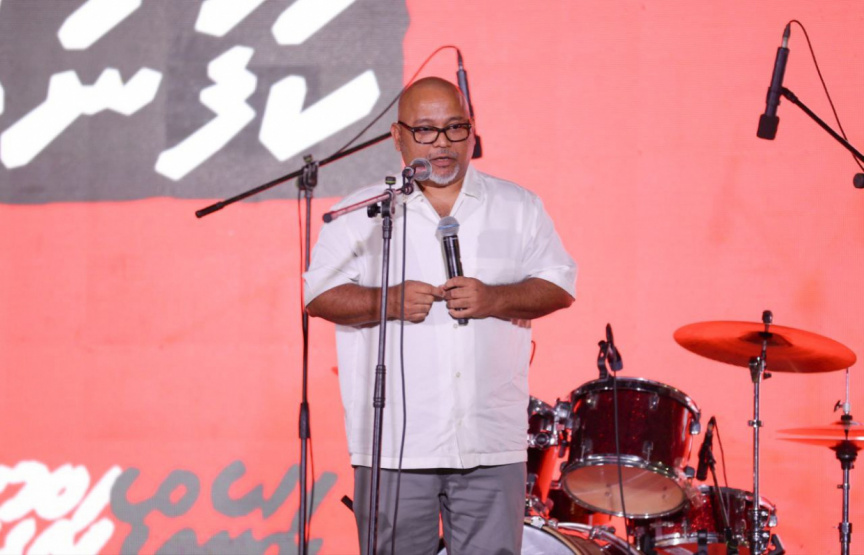
Former attorney general Dr. Ahmed Ali Saward speaks at the open mic forum organized by MJA regarding the media control bill on September 13, 2025. (Sun Photo/Mohamed Afwaan Solah)
Former attorney general Dr. Ahmed Ali Sawad, on Saturday night, described the controversial media bill currently in the Parliament’s Committee stages as a huge deception, citing its true purpose as regulating the public and controlling their right to freedom of expression under the ruse of “media regulation”.
Sawad made the remark while speaking at the open mic forum organized by Maldives Journalist Association (MJA) regarding the media control bill which was aimed raising public awareness regarding the legislature.
Speaking at the forum, Sawad stated that while the bill may appear to be submitted with good intentions on the surface, its true purpose becomes evident upon reading its contents.
“It becomes evident upon reading Article 80, Article 60 and Article 61 that apart from journalists, it contains mentions of other things. Particularly, all individuals residing on Maldivian soil that uses internet will be regulated under the name of regulating the media. There is clearly a huge deception involved in this,” he said.
Sawad emphasized that the constitution guarantees the right to freedom of expression, freedom of the press, and the right to protect one’s name and reputation as fundamental rights. He added that if any of these rights are to be restricted, the constitution clearly outlines the specific circumstances under which such limitations are permitted.
He detailed that Article 16 of the constitution states any fundamental rights can only be restricted by a law passed by the parliament which does not contradict the constitution. In this regard, he explained that the constitution does not prevent the restriction of fundamental rights through legislation passed by parliament, provided it is done to uphold and protect the principles of the Islamic religion.
Furthermore, Sawad emphasized that the constitution requires that any restrictions on fundamental rights must align with the principles observed in democratic societies, while also complying with international conventions to which the Maldives is a party.
Speaking further, Sawad noted that in democratic societies, media regulation typically begins with the participation and consultation of the media itself.
“This bill has gone wrong in this point alone,” he added.
He detailed that that according to best practices observed by organizations like the EU, and the UN, issues related to the media are most effectively addressed through self-regulation—meaning they should be resolved by those directly involved in the sector.
Sawad stated that the main reason for this is that it is the media that informs the public about both the positive and negative actions of the three branches of the state: the executive, the legislative, and the judiciary.
He underscored that the public will be deprived from the opportunity to form their own opinion regarding the functioning of the state without an independent press. He added that the public can only form an opinion on the government with sufficient information.
Sawad named the current Maldives Media Council as one of the best institutions for regulating the media, highlighting that it operates independently without involvement from the government, parliament, or any political party.
However, he said the only independent institution regulating the media will be abolished if the bill is passed. In this trajectory, he underscored that three out of the seven members of Maldives Media and Broadcasting Commission incepted under the bill would be appointed by the president.
“This is control, not regulating,” he stressed.
Sawad underscored that the bill comprised of provisions that would allow action over posts on social media. While people of all ages use social media in the Maldives, Sawad underscored the possibility of people being jailed due to the legislature.
The controversial media bill, introduced for the second time by Thulhaadhoo MP Abdul Hannan Abubakar who is aligned the government, includes numerous provisions granting the government significant control over the media. Despite significant protests, the bill was accepted in Parliament and is currently in the review stage.
On Thursday, the government proposed 14 amendments to the media bill, including a provision for no action against individual journalists.